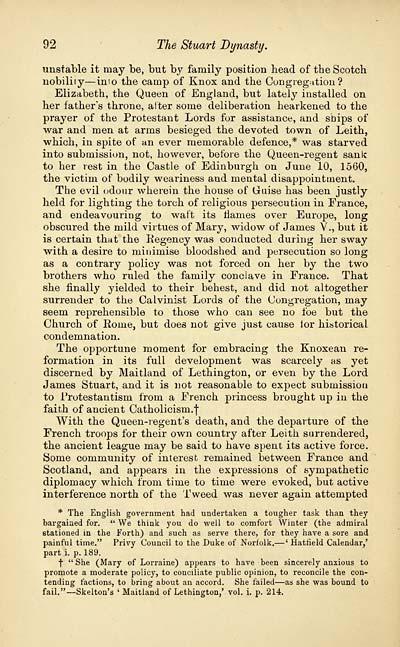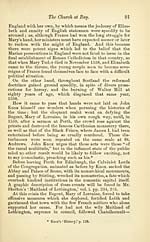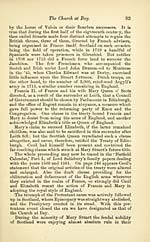Stuart dynasty
(112) Page 92
Download files
Complete book:
Individual page:
Thumbnail gallery: Grid view | List view

92 The Stuart Dynasty.
unstable it may be, but by family position head of the Scotch
nobility — into the camp of Knox and the Congregation?
Elizabeth, the Queen of England, but lately installed on
her father's throne, alter some deliberation hearkened to the
prayer of the Protestant Lords for assistance, and ships of
war and men at arms besieged the devoted town of Leith,
which, in spite of an ever memorable defence,* was starved
into submission, not, however, before the Queen-regent sank
to her rest in the Castle of Edinburgh on June 10, 1560,
the victim of bodily weariness and mental disappointment.
The evil odour wherein the house of Guise has been justly
held for lighting the torch of religious persecution in France,
and endeavouring to waft its flames over Europe, long
obscured the mild virtues of Mary, widow of James V., but it
is certain that the Regency was conducted during her sway
with a desire to minimise bloodshed and persecution so long
as a contrary policy was not forced on her by the two
brothers who ruled the family conclave in France. That
she finally yielded to their behest, and did not altogether
surrender to the Calvinist Lords of the Congregation, may
seem reprehensible to those who can see no foe but the
Church of Rome, but does not give just cause lor historical
condemnation.
The opportune moment for embracing the Knoxean re-
formation in its full development was scarcely as yet
discerned by Maitland of Lethington, or even by the Lord
James Stuart, and it is not reasonable to expect submission
to l'rotestantism from a French princess brought up in the
faith of ancient Catholicism. f
With the Queen-regent's death, and the departure of the
French troops for their own country after Leith surrendered,
the ancient league may be said to have spent its active force.
Some community of interest remained between France and
Scotland, and appears in the expressions of sympathetic
diplomacy which from time to time were evoked, but active
interference north of the Tweed was never again attempted
* The English government had undertaken a tougher task than they
bargained for. " We think you do well to comfort Winter (the admiral
stationed in the Forth) and such as serve there, for they have a sore and
painful time." Privy Council to the Duke of Norfolk. — ' Hatfield Calendar,'
part i. p. 189.
f "She (Mary of Lorraine) appears to have been sincerely anxious to
promote a moderate policy, to conciliate public opinion, to reconcile the con-
tending factions, to bring about an accord. She failed — as she was bound to
fail." — Skelton's ' Maitland of Lethington,' vol. i. p. 214.
unstable it may be, but by family position head of the Scotch
nobility — into the camp of Knox and the Congregation?
Elizabeth, the Queen of England, but lately installed on
her father's throne, alter some deliberation hearkened to the
prayer of the Protestant Lords for assistance, and ships of
war and men at arms besieged the devoted town of Leith,
which, in spite of an ever memorable defence,* was starved
into submission, not, however, before the Queen-regent sank
to her rest in the Castle of Edinburgh on June 10, 1560,
the victim of bodily weariness and mental disappointment.
The evil odour wherein the house of Guise has been justly
held for lighting the torch of religious persecution in France,
and endeavouring to waft its flames over Europe, long
obscured the mild virtues of Mary, widow of James V., but it
is certain that the Regency was conducted during her sway
with a desire to minimise bloodshed and persecution so long
as a contrary policy was not forced on her by the two
brothers who ruled the family conclave in France. That
she finally yielded to their behest, and did not altogether
surrender to the Calvinist Lords of the Congregation, may
seem reprehensible to those who can see no foe but the
Church of Rome, but does not give just cause lor historical
condemnation.
The opportune moment for embracing the Knoxean re-
formation in its full development was scarcely as yet
discerned by Maitland of Lethington, or even by the Lord
James Stuart, and it is not reasonable to expect submission
to l'rotestantism from a French princess brought up in the
faith of ancient Catholicism. f
With the Queen-regent's death, and the departure of the
French troops for their own country after Leith surrendered,
the ancient league may be said to have spent its active force.
Some community of interest remained between France and
Scotland, and appears in the expressions of sympathetic
diplomacy which from time to time were evoked, but active
interference north of the Tweed was never again attempted
* The English government had undertaken a tougher task than they
bargained for. " We think you do well to comfort Winter (the admiral
stationed in the Forth) and such as serve there, for they have a sore and
painful time." Privy Council to the Duke of Norfolk. — ' Hatfield Calendar,'
part i. p. 189.
f "She (Mary of Lorraine) appears to have been sincerely anxious to
promote a moderate policy, to conciliate public opinion, to reconcile the con-
tending factions, to bring about an accord. She failed — as she was bound to
fail." — Skelton's ' Maitland of Lethington,' vol. i. p. 214.
Set display mode to:
![]() Universal Viewer |
Universal Viewer | ![]() Mirador |
Large image | Transcription
Mirador |
Large image | Transcription
Images and transcriptions on this page, including medium image downloads, may be used under the Creative Commons Attribution 4.0 International Licence unless otherwise stated. ![]()
| Histories of Scottish families > Stuart dynasty > (112) Page 92 |
|---|
| Permanent URL | https://digital.nls.uk/94819110 |
|---|
| Description | A selection of almost 400 printed items relating to the history of Scottish families, mostly dating from the 19th and early 20th centuries. Includes memoirs, genealogies and clan histories, with a few produced by emigrant families. The earliest family history goes back to AD 916. |
|---|

